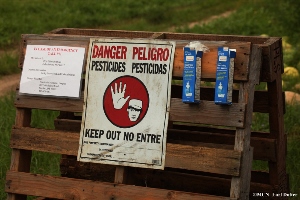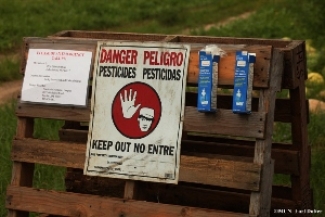Protect Children in the Fields- Raise the Minimum Age Requirement for Handling Pesticides
The proposed revisions to the Worker Protection Standard have many positive elements and I, along and many others concerned about farm worker health applaud the EPA for this long-awaited proposal. In particular, for the first time an age requirement has been proposed to determine who is eligible to handle pesticides. However, for unknown reasons the proposed age requirement has been identified as age 16 when it should be age 18. There is no rationale to suggest any minor, i.e. youth under age 18, should be permitted to be responsible for and potentially exposed to such dangerous chemicals. It was anticipated that the age requirement would be 18, but it is believed that the USDA did not agree. Since 1990, the agriculture child labor regulations in Washington State, with a major agriculture industry, have prohibited any teen under age 18 from mixing, loading or applying pesticides. The non-agricultural rules also prohibit any minor from performing tasks involving the use of other hazardous chemicals. This is also true under many other states’ regulations.

The risks and health hazards of pesticides are well-known. Adolescents are at an increased risk to these hazards due to their vulnerability and susceptibility to adverse health impacts due to the fact that they are in a stage of rapid and significant developmental physiologic changes.
In addition, the use of any dangerous chemical requires a great deal of knowledge and understanding, along with maturity, judgment and experience to execute safely and correctly; and even then, the risks remain high. During this time in their lives, they are experiencing a great deal of change, learning many new things and facing difficult challenges. Their ability to focus can be compromised. Compared to adults, adolescents have less-developed cognitive abilities, physical coordination and overall maturity. They often have a limited perception of danger and may engage in risk-taking behaviors as a result. Many lack the self-confidence and communication skills to effectively question or convey concerns to their supervisors or may fear losing their job. Even speaking up to an adult or a person of authority is difficult for many young workers.
Although the issues presented above define certain vulnerabilities specific to teens, the main reason to restrict the use of pesticides to only adult workers, age 18 or older, is the presence of a serious hazard and harmful effects. No amount of training changes these facts; and regardless of age, the dangers remain. However, we have a duty, as adults and particularly policy makers, to make the best decisions possible to protect children and youth who are not often in a position to speak or act on their own behalf. The precautionary principle requires us to exercise more caution, not less, when we cannot be absolutely be certain that a hazard is not present or that it can be sufficiently controlled. We have a long way to go in this regard when it comes to pesticides. Therefore no one under age 18 should be permitted to perform work that involves mixing, loading or applying pesticides, or any other activities involved with handling them.
- Log in to post comments





